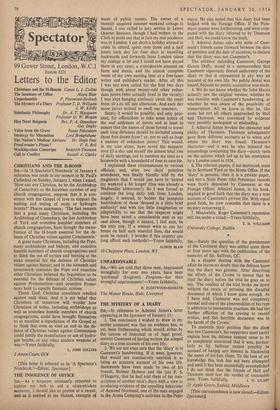SIR, —In reference to Admiral James's letter appearing in the Spectator
of January 13 :
1. The conclusion I wished to draw in my earlier comment was that no evidence has, as yet, been forthcoming which would, either by the canons of historical or of legal proof, convict Casement of having written the alleged diary as a true account of his own life.
2. We are not even sure that the 'diary' is in Casement's handwriting. If it were, however, that would not conclusively establish it as being an accurate account of his own life. Statements have been made by two of his friends, Bulmer Hobson and the late P. S. O'Hegarty, that he had told them of his tran- scription of another man's diary with a view to producing evidence of the appalling behaviour of Armand Normand, one of the men engaged in the Arana Company's activities in the Pulu-
mayo. He also stated that this diary had been lodged with the Foreign Office. If the Putu- mayo papers were forthcoming, and were com- pared with the diary referred to by Thomson and Hall, we could know the truth.
3. Admiral James asks why none of Case- ment's friends came forward between the date of sentence and the date of excution, to declare that the diary was not Casement's.
The solicitor deferiding Casement, George Gavan Duffy, stated in a memorandum that Casement vigorously denied authorship of the diary or that it represented in any way an account of his own life. No public denial was issued, because no public accusation was made.
4. We do not know whether Sir John Harris actually saw the original version; whether he was familiar with Casement's handwriting, or whether he was aware of the possibility of transcription. All we know is that he, like some but not all others approached by Hall and Thomson, was convinced by evidence very possibly inadequate or misleading.
5. Admiral James invokes the character and ability of Thomson. Thomson subsequently gave three different accounts as to when and where the diary was found. Thomson's character—and it was he who initiated the proceedings concerning the diary—partly rests on the actions which led up to his conviction by a London court in 1926.
6. The relevant papers, if not destroyed, must be in Scotland Yard or the Home Office. If the 'diary' is genuine, then it is a private paper, and not a State Paper (the Putumayo records were freely deposited by Casement at the Foreign Office). Admiral James, in his book, implied in good faith that the diary was a true account of Casement's private life. With equal good faith, he now concedes that there is a mystery concerning it.
7, Meanwhile, Roger Casement's reputation still lies under a cloud.—Yours faithfully,
T. D. WILLIAMS
University College, Dublin


































 Previous page
Previous page